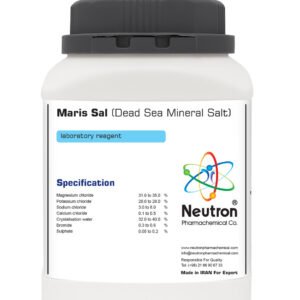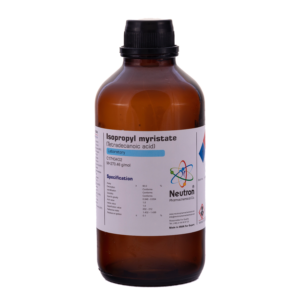آب دی یونیزه
| Formula (Hill): | H2O |
| Density: | 1.00g/cm3 (20 °C) |
| Molar mass: | 18.02 g/mol |
| CAS number: | 7732-18-5 |
| HS code: | 28510010 |
| EC number: | 231-791-2 |
| Storage | Store at +5 to +30 °C |
| SDS | Available |
| RTECS: | ZC0110000 |
| Odour: | Odourless |
| Form: | Liquid |
| Color: | Colourless |
| Boiling point: | 100 °C |
| Melting point: | 0 °C |
| Vapour pressure: | 23hpa (20°C) |
| Viscosity dynamical: | 0.952 mPa*s (20 °C) |
| Description | Conforms | ||
| Appearance | Conforms | ||
| Ammonia | Conforms | ||
| Chloride | Conforms | ||
| Calcium | Conforms | ||
| Sulfate | Conforms | ||
| Oxidizable substances | Conforms | ||
| Magnesium | Conforms | ||
| Nitrate | Conforms | ||
| Evaporation residue | ≤ | 5 | mg/l |
| Spec Conductance @25°C | ≤ | 0/005 | mS/cm |
| (at the time of manufacturing) | |||
| pH@25°C | 5.0 – 7.1 |
Deionized Water (DI Water) is purified water that has had most of its mineral ions, such as cations like sodium, calcium, iron, and copper, and anions like chloride and sulfate, removed through ion-exchange processes. It is widely used in pharmaceutical and laboratory applications as a solvent, diluent, and cleaning agent due to its high purity and chemical neutrality.
🏭⚗️ Production
Deionized water is produced by passing feed water through ion-exchange resins that replace dissolved ionic impurities with hydrogen and hydroxyl ions, forming pure water molecules. Additional purification steps, such as reverse osmosis, activated carbon filtration, and UV treatment, may be employed to achieve higher purity standards. The resulting water meets pharmaceutical and laboratory specifications for conductivity, total organic carbon (TOC), and microbial content.
🔬 Properties
Deionized water is a clear, colorless, and odorless liquid with a neutral pH (typically 6–7) and very low electrical conductivity. It contains minimal dissolved solids and is free from ionic contaminants, making it chemically inert in most formulations. However, because of its high purity, deionized water is highly reactive toward environmental gases and surfaces, and it readily absorbs carbon dioxide, which can slightly lower its pH over time.
🧪 Applications
In pharmaceutical formulations, deionized water is used as a solvent, vehicle, and diluent in the preparation of solutions, suspensions, and topical products. It serves as a base for buffer preparation and as a component of cleaning and rinsing systems in sterile manufacturing. In laboratory settings, deionized water is essential for reagent preparation, sample dilution, glassware rinsing, and analytical procedures where ionic contamination must be avoided. It is also used in spectroscopic and chromatographic analyses to maintain precision and accuracy.
⚠️ Safety
Deionized water is non-toxic and safe for pharmaceutical and laboratory use. However, because it lacks dissolved minerals, it should not be used for direct consumption. Proper hygiene must be maintained during handling and storage to prevent microbial growth or contamination. The water should be stored in clean, tightly sealed, inert containers, away from light, dust, and chemical vapors, to preserve its purity and quality.




